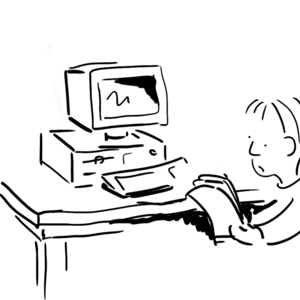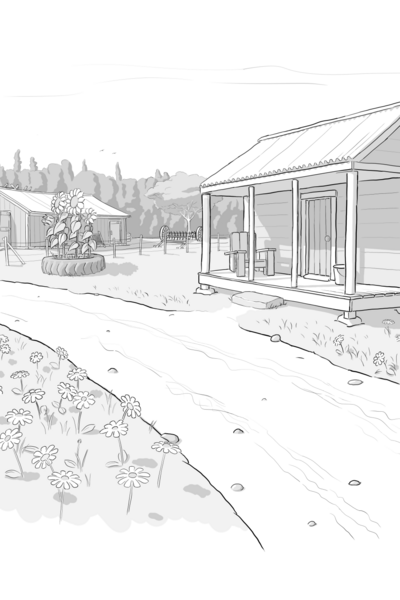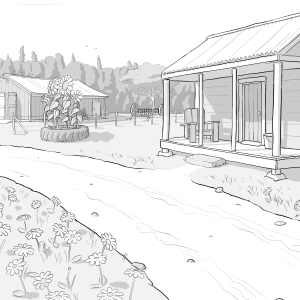When war came again, I thought that age would spare me, and at first it did, but soon the situation became desperate and I was called up. Some of the townspeople gathered to see me off, and shouted encouraging words as I climbed onto a truck full of drab men. Grigory had died five years earlier, but his young son was there. “Now that our war hero is in the fight the Germans are done for!” He said. Apparently he had not been told the truth of my war experience. I boxed the air, and tried to smile bravely.
As a veteran, it was assumed that I needed no training, and so I was hastily sent to fill out a brigade for the defense of Moscow. I could have complained that I was unprepared, but so was everyone in our squad. The Lieutenant who led us had been a philosophy student just three months before.
We walked through the rubble looking for the enemy, but found none. At one time, we saw muzzle flashes through the dust, and our Lieutenant ordered us to fire on the dubious claim that he could identify a German muzzle flash. I aimed low.
After eight days of blundering around the ruined suburbs of the city and occasionally shooting at an enemy who was out of range, I was again saved by woodwork. This time it was a plank full of nails that I walked into.
In hospital I learned that the Germans had pulled back from Moscow. After two weeks I was again fit, but given my age, and my now even more impressive collection of war wounds, it was decided to send me home. As I headed South, I learned that America had joined the fight, and I imagined that we would soon be secure.
***
I had barely arrived home when the Germans headed South as well. Everyone in town was hungry, but it was nothing compared to the privations being experienced elsewhere. The road was always full of soldiers heading one way, and refugees heading the other. Fear was pervasive, but I never imagined the enemy would make it so far, or that they would bother with so remote a place.
We learned of their coming two days before they arrived. Some of the townspeople, who felt themselves to be at particular risk due to party affiliations or ancestry, or who were simply adventuresome, fled to the woods. Grigory’s son tried to convince me to join them.
“You’re just what we need!” He said.
I protested my age and cowardice and inexperience, but he would not believe. Eventually, though, after I had given him my ancient rifle, he was forced to leave, unsatisfied, to join the group. They styled themselves partisans, but had I been among them I would have been the one with the most fighting experience.
***
There were no pointy helmets this time, and they occupied our town without resistance or fanfare. Most of them took residence in the school, which was our largest brick building, and then went house to house confiscating weapons.
For a week, this awkward cohabitation persisted. We had heard much of the invaders’ brutality, but this group, several hundred strong, remained apart and inoffensive. They even took the surprising action of assigning a liaison from among our town council. Their commander was seen from time to time with his aides, as they prepared to make a defensive stand at the river’s edge. As they strolled about, pointing at things and conversing over a map, I wondered at how men at the front could remain so clean and proper. They Dynamited the big bridge, and knocked down several other structures for obscure reasons, and then they waited.
The group in the woods, I hoped, would be hungry but safe. There were small commotions a few times as some among them ventured near town to steal food from the Germans, whose vehicles and supplies were everywhere. A couple of times they even took pot-shots at the enemy, but none of these offenses was serious enough to provoke a response.
Our strange stalemate ended on the fourth morning, when the Germans awoke to find that the tires had been slashed on several of their vehicles. This, seemingly minor offense, was as serious to the enemy as losing the vehicles themselves, and they reacted swiftly.
Our houses were ransacked, and all were questioned. I, having a soldier’s uniform in my closet, and many sharp tools was among those taken to the school for interrogation.
I was herded across town along with two other men.
“Just play dumb” One of them whispered as a rifle prodded his back. I nodded slightly.
We were taken to a room on the ground floor, and made to stand in front of their commander. He looked at us for what felt like a long time and then spoke a short command.
“Get in the closet” Said one who spoke Russian, and the three of us were herded into a small storage room. We stood there, frightened to speak in case someone was listening. After several minutes, a man in an officer’s hat poked his head in the door. He appraised us for a moment, then pointed at one of my companions and said “Du”.
As the chosen man walked out, I could see that there was a chair in the center of the room around which stood the Commander, and two other officers. Helmeted soldiers stood at the outdoor entrance, and at the door to our closet. The door closed.
My companion and I put our ears to the door, but the only intelligible words were of a man saying “I don’t know”. I repeated this to myself. I’d been given a bit part in a play, and that was my only line. I mustn’t mess up.
After a few minutes, we heard boots crossing the floor in our direction. Just as they arrived, we were startled by a gunshot. I began shaking. “I don’t know, I don’t know...”
Again, the officer’s head appeared, and this time he beckoned my remaining companion to come. I got a glimpse of the room, and saw no body. They must have done it outside.
Before my companion left, he looked at me and grabbed my forearm.
“They’re going to kill you either way. So say nothing!” he whispered, and then I was alone. I put my ear to the door, but I couldn’t discern the words.
Soon I heard another gunshot, and approaching footsteps. Now that I was finally going to die, my worry subsided. I would keep quiet, and get beaten and shot. No trouble at all.
The door opened, and I made ready to follow the officer, but before I could, the commander standing in the middle of the room said something, and the door was closed again. I began to feel agitated, like someone in a shop, who felt he was getting worse service than the other customers.
An officer finally came and beckoned me to follow. I was politely asked to empty my pockets onto a desk, and then made to sit in a chair in the middle of the room. Their captain stood to the left, and there was another officer to the right, and a big man stood behind me. They were as well manicured up close as they had seemed at a distance. The commander said something, and another officer interpreted.
“We will find these partisans with or without your help.” The big man put his hand on top of my head, and I lost control of myself.
“Then you will have to find them without my help!” I could hear myself coming apart. I had flubbed my only line.
The interrogators stood quietly for a moment, and then began to converse. They seemed genuinely surprised by what I had said. What had I said?
“So there are partisans?” said the translator, looking at me to read my reaction. A man with a map was summoned, and the men all gathered around it talking and pointing. “Ja”, I heard, and “Hier”. Then terror gave way to panic when I recognized the word for bridge. I had tipped them off to the presence of partisans, and their hiding place was obvious to such experienced fighters.
The commander issued orders to a man who ran off, then he stood at a window, watching as soldiers piled into a car that still had tires. He walked back towards me as I watched them drive off. I could see eight or ten helmets sticking up. There were more than forty hiding in the woods, but I knew they didn’t stand a chance.
Once the car was gone, I became aware that the two other men who had been questioned were also outside, standing between two soldiers. Nobody had even been shot. The big man placed his hands on my shoulders as I looked up at the commander, who looked back blankly. I should have lunged and thrashed, but I only whimpered and sank in my seat.
The commander stood over me for a while and then walked over to the desk, and idly fingered the items that had been taken from our pockets. He stood there looking down, and then without a word he walked out of the building.
The officers, clearly surprised by the departure of their commander, disputed among each other and eventually locked me back in the closet with a bottle of water. I sat there for days, drinking when my thirst was unbearable, and peeing in my pants. Eventually a woman appeared and let me out. We had been liberated.
Nobody blamed me for what had happened to the people hiding by the old bridge. It had been a small incident among great sufferings. Some had scattered into the woods, but I knew that Grigory’s son would not be among them. The next week I went blind from drinking poorly made vodka, and a week later I died of septicemia.
***











Comments (0)
See all